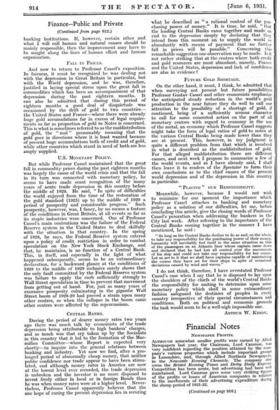CENTRAL BANKS.
During the period of dearer money rates two years ago there was much talk by economists of the trade depression being attributable to high bankers' charges, and so much was that cry taken up by the Socialists in this country that it led to the formation of the Mac- millan Committee—whose Report is expected very shortly—to inquire into the general relations between banking and industry. Yet now we find, after a pro- longed period of abnormally cheap money, that neither public confidence nor trade appear to have been stimu- lated, and although money rates in America are now at the lowest level ever recorded, the trade depression is unbroken and the investor is no more disposed to invest freely either in local or in foreign Bonds than he was when money rates were at a higher level. Never- theless, Professor Cassel apparently believes that the one hope of curing the present depression lies in securing what he described as " a rational control of the pia. chasing power of money." It is time, he said, " that the leading Central -Banks came together and made an end to the depression- simply by declaring that they intend from this moment on to supply the world so abundantly with means of payment that no further fall in prices will be possible." Concerning this remarkable suggestion one observation may be made. Is it not rather striking that at the centres where both credit and gold resources are most abundant, - namely, France and the United States, depression and lack of confidence are also in evidence ?






































 Previous page
Previous page